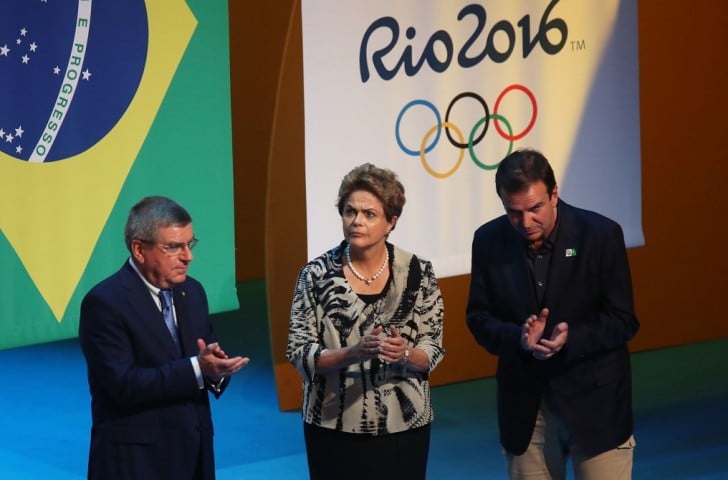Brazil Summer Olympics Could Be Without a President as Country’s Lower House Votes for Impeachment
Posted on: April 18, 2016, 09:22h.
Last updated on: April 18, 2016, 04:35h.

The 2016 Brazil Summer Olympics commence in Rio de Janeiro on August 5, but by the time athletes from around the globe arrive in the South American city, the country could be without its president.
On Sunday, the Chamber of Deputies, Brazil’s lower house, voted 342-137 to impeach President Dilma Rousseff for allegedly concealing a massive budget deficit to win re-election in 2014. Brazil is in the midst of its worst economic recession in decades, and citizens are looking to its leader to place blame.
The impeachment proceedings now move to Brazil’s Federal Senate where the motion will need support from 41 of the 81 senators. Should that happen, Rousseff would be forced to step down for 180 days in order to defend the charges against her.
Assuming enough support is present in the Senate to remove Rousseff, Vice President Michel Temer would serve as interim president. Rousseff is adamant she’s committed no illegal acts and plans to defend her position.
“Impeachment without proof of a crime is what? It is a coup,” she stated last week. “We are discussing a very concrete impeachment without crime.”
One Problem After Another
When the International Olympic Committee (IOC) awarded Brazil and Rio the Summer Olympics over finalists Madrid, Tokyo, and Chicago back in 2009, the decision was anticipated to be Brazil’s welcoming party to the worldwide economic stage.
Dating back to 1994, Brazil’s economy roared for some 15 years. Gross domestic product (GDP) showed promising growth of 5.7 percent in 2004, followed by annual returns of 3.2 percent, 4.0 percent, 6.1 percent, and 5.1 percent.
All appeared well in 2009 when the IOC was deliberating whether South America was ready and capable of hosting its first Olympics. In the third and final round of bidding, Rio topped Madrid 66-32 to receive the 2016 Summer Olympics.
Since its acceptance, it’s been one misstep after another for Brazil.
Concerns over the Zika virus continue to run rampant. Though officials are downplaying its risk to tourists and athletes, the disease transmitted by infected mosquitos poses severe dangers to pregnant women and often produces birth defects in newborns.
The heavily polluted and stagnant water surrounding the city has also raised fears among health experts. In July, tests found human sewage and disease-causing viruses at levels 1.7 million times what would be considered high in the United States and Europe.
Zika and poor water quality are just two of the many reasons why only half of the 7.5 million spectator tickets have been sold to date.
One Big Gamble
Olympic authorities certainly have their hands full and plenty of reason for worry as the Summer Games approach. Along with rushing to finish construction on several venues, the 2016 Olympics seems to be quite a gamble for the IOC.
The one thing that isn’t a gamble when it comes to the Rio Games is gambling itself.
Nevadans and tourists visiting Las Vegas or Reno during the Olympics will have the option to bet on the Games, but those in the host country will be forbidden. Brazilian lawmakers weren’t able to pass gambling and sports betting legislation until late last year, meaning casinos and betting halls won’t be constructed in time for this summer.
Related News Articles
2018 Super Bowl Most-Bet Game in NFL History With $158.58 Million Handle
Most Popular
VEGAS MYTHS BUSTED: Sinatra Got His Teeth Knocked Out by a Casino Exec
ALL-OUT! Sahara Will Be 7th Vegas Strip Casino to Fold Poker Room in 5 Years
Lisa Vanderpump Buys $5M Vegas Mansion
Las Vegas’ Ellis Island Getting All Fancy
Most Commented
-
UPDATE: Giant Naked Donald Trump Removed from Side of Las Vegas Freeway
— October 1, 2024 — 17 Comments -
VEGAS MYTHS RE-BUSTED: Las Vegas is in Imminent Danger of Running Out of Water
— September 27, 2024 — 11 Comments -
LOST VEGAS: Bobby Berosini’s Orangutans
— October 2, 2024 — 5 Comments -
LOST VEGAS: Art Bell’s House and Radio Compound
— September 16, 2024 — 3 Comments -
VEGAS MYTHS RE-BUSTED: The Final Resting Place of Whiskey Pete
— October 25, 2024 — 3 Comments
















No comments yet